The story of an ANZAC
John (aka Jack) James Sloan
April 3rd 1878 – January 4th 1961
By Bruce Donaldson

Medals presented to John (aka Jack) Sloan during his years of Service
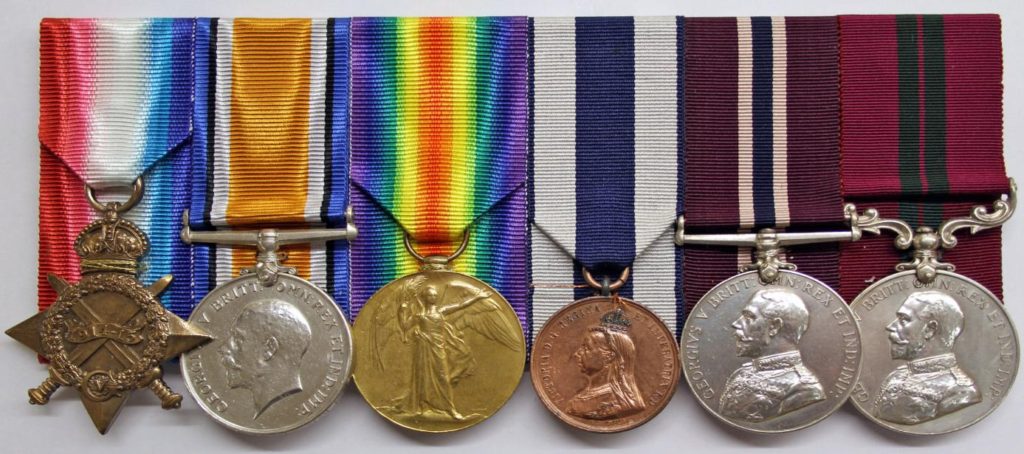
Preface
Historically, the Sloan family has been well documented over many years. The initial records and writings of both Isabella Sloan (nee Whyte) and Catherine McLennan (nee Sloan) have been handed down through three generations. Their writings, record their recollections of life on the gold field of “Lambing Flat”, now Young, and the family’s early life in Molesworth, Victoria. Ongoing attention by family members, have ensured the preservation of original documents. The fact that original records, related to the Sloan Family, dating back 150 years still exist, is a credit to both our forebears and in particular to Jean and Keith Jordan, the custodians of these archives. Additionally, Ross McLennan’s extensive work digitizing and researching additional family history is acknowledged. Without such individual commitment, historical stories about family members could not be developed.
Jack Sloan was my great uncle. He was an uncle of my mother Isabel (nee McLennan) Donaldson and in turn an uncle of her brothers and sisters. When I was about ten in 1953, I actually met Jack Sloan at a small family gathering held at the home of our Aunty, Jessie McLennan, in Blaxland. Jack would have been approximately 75 years of age. My brother Douglas happened to ask Jack about his time at Gallipoli, however the conversation was brief and redirected by others. None of the words, briefly exchanged, can be recalled. In recent times I discovered typed transcripts of “Jack Sloan’s Letters”, which had been typed approximately 50 years ago by a family member.
Australia rightly recognizes significant events of war, and the impact these conflicts have had on individuals. This occurs by acknowledging the sacrifices they made and as such we have a deep respect for the individuals who fought in these conflicts. It is therefore appropriate that the three brothers of the Sloan family, Hannibal, Jack and James, our great uncles, be acknowledged as men of courage who joined with thousands upon thousands of others to fight in wars overseas.
Additionally, the importance of the Sloan Brothers has been recognised and acknowledged by the Maryborough Military & Colonial Museum in Qld, which purchased the medals of the Sloan family at auction in 1997. There are a number of reasons why this museum regards the Sloan brothers Hannibal, Jack and James, as well as two sons of Jack Sloan, as significant. Jack was a member of the 1897 Queen Victoria Jubilee contingent from NSW to England. Both Hannibal and Jack Sloan were awarded the scarce Permanent Forces Beyond the Seas Long Service Medal, and both were awarded the Meritorious Service Medal. Hannibal Sloan, Jack’s brother, was the author of “The Purple and Gold”, a history of the 30th Battalion and the battalion’s engagement during the First World War. It is rare to find medal groups of permanent soldiers, from the same family, covering long periods of military service and equally rare to have a collection of such medals in the one location.
This story may assist future generations of our families to increase their understanding and knowledge related to “The ANZAC Story”, which many of them will study in school or visit a war memorial or participate in ceremonies of commemoration. This brief outline of the background and the writings of a relative, Jack Sloan, who landed at Gallipoli on Sunday, 25th April, 1915, may become a point of reference.
Bruce Donaldson March 2020 A digital copy of this booklet is available upon request.
Acknowledgments
# Jean and Keith Jordan # Angela Bright
# Ross McLennan # Jack Couch
# Family Ancestors and Descendants # Australian War Memorial
# The Maryborough Military & Colonial Museum Qld # Wikipedia
# John Meyers & Robert Simpson of the Maryborough Military Museum.
Introduction
John (Jack) James Sloan
April 3rd 1878 – January 4th 1961
This is the story and record of John James Sloan, commonly called Jack Sloan, who was an uncle of Isabel (nee McLennan) Donaldson and her brothers and sisters. He was a soldier in The New South Wales Military Forces who became a Warrant Officer and a Staff Sergeant Major in the Australian Imperial Force. He, along with the 4th Battalion, landed at Gallipoli on Sunday, 25th April, 1915. Jack was an ANZAC.
On the morning of Sunday, 25th April, 1915, the Allied Forces, consisting of Australian, New Zealand, Indian, French and British soldiers, set out to capture the Gallipoli Peninsula in order to open the Dardanelles for the allied navies. On the 19th and 20th December 1915, after 8 months of fighting, the allied forces were evacuated with both sides suffering heavy casualties and enduring great hardships. The number of Australian soldiers killed at Gallipoli, totalled 8,709, with many more suffering injuries. Similarly, New Zealand lost 2,780 soldiers killed and many more wounded.
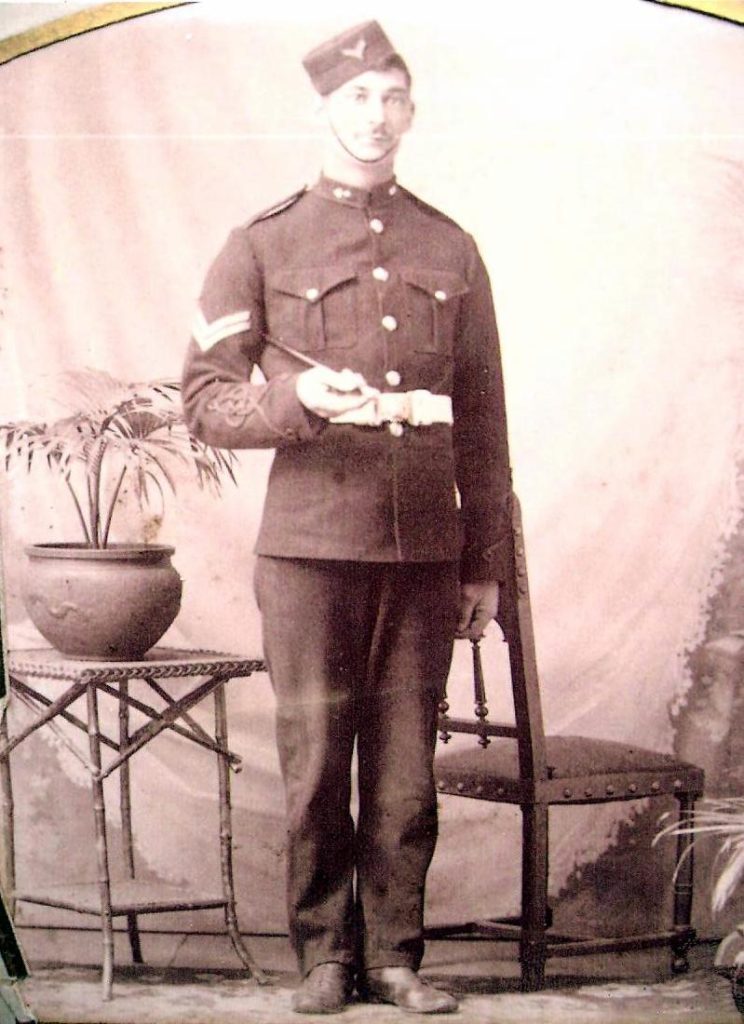
Jack Sloan in dress uniform of “The NSW Military Force”, which was formed prior to the establishment of the Australian Defence Force. Jack Sloan was approximately 24 in this picture. The 2 stripes on his sleeve granted him the rank of a Corporal.
An ANZAC
John (Jack) Sloan.
John James Sloan, commonly known as Jack was born in Molesworth, Victoria, on Wednesday 3rd April 1878. He was the fourth child of John Hannibal Sloan (1841-1919) and Isabella (nee Whyte) Sloan (1850 -1930). John and Isabella Sloan had eight children. The Sloan family had moved to the Molesworth area in 1859 to take up land and finally establish life as farmers. The children were well educated at the local Molesworth School and left school to begin work locally where possible. Some of the girls became domestic servants on large farming properties and the boys spent some time working on farms. In the early 1890s Australia had a major depression and a prolonged drought. Between 1890 and 1893 there was a shipping strike and the great shearers strike of 1891. Additionally, 11 banks collapsed requiring government intervention. To get work, some of the older members of the Sloan family travelled to New Zealand to work on farms and as shearers. The eldest sons of the family, Hab (Hannibal) and Jack obtained work in New Zealand. At one time their father, John Hannibal Sloan, moved to New Zealand and worked as a shearer. By 1893 the Australian economy was improving and eventually the men of the Sloan family all returned to Australia. They, along with other members of their family settled in Sydney.
Jack Sloan joined the New South Wales Military Force in 1896 at the age of 18. In 1897 as a corporal, he went to England as part of the NSW Contingent for The Diamond Jubilee of Queen Victoria. This ceremony, to mark the 60th anniversary of Queen Victoria’s reign, was held in London on 22nd June 1897. The Australian Contingent members joined representatives from other countries to form what was known as “The Colonial Contingent”. For this ceremony he received The Queen Victoria Diamond Jubilee Medal. By 1904 he had been serving in the army for 8 years and transferred to the Instructional staff in the Australian Defence Force with the duties of a drill instructor. He continued in this role for the next 10 years until 1914. The duties of drill instructor resulted in him being posted to various parts of NSW.
In 1906 at the age of 26, Jack Sloan married Alice Ridd (1878 -1944) who was the daughter of a well-known local Molesworth family. The Ridd family had been friends of the Sloan family for some time. Alice’s father, Charles Ridd (1830 -1903) owned the local shop. Alice was a dressmaker by trade and conducted her business from her father’s shop. After they were married in Molesworth Jack and Alice moved around NSW which is indicated by the locations at which their children were born. They had four children. John Hannibal Sloan (1907-1972) was born at Waratah, Newcastle, Charles Lindsay (1910-1947) was born at Tamworth, Douglas Lutton (1912-1977) was born at Armidale and Sidney Wilson (1918-1956) was born at Randwick. By 1918, Jack and Alice finally settled at 13 Avoca St, Randwick.
At the age of 36, Jack enlisted for service abroad on 27th September, 1914, at Holsworthy Military Base, with the service number of 672. He then moved, as a Staff Sergeant Major, to the base at Kensington. The Unit to which he was assigned become part of the 4th Battalion. His unit embarked on 19th Oct, 1914 and went via Suez to Alexandria, in Egypt, arriving at Alexandria 6th December, 1914. The Fourth Battalion of The Australian Forces became part of the first wave of Australians to land at Gallipoli on Sunday, 25th April, 1915. At Gallipoli Jack Sloan served as a Staff Warrant Officer Class 1 and a Staff Sergeant Major. From the 1st May until his departure from Anzac, he was the Regimental Sergeant Major of the unit. During this time, he encountered and survived a significant number of enemy attacks including an attack on the beach as he was departing. This explosion of shells left one of his companions critically injured.
Eventually this attack and other events resulted in him suffering shellshock and on 15th June, after serving at Gallipoli for 2 months, he was transferred to a ship to be transported to a hospital in Alexandria to recover. After 5 weeks in Alexandria he was deemed unsuitable to return to Gallipoli and was transferred by ship to England for further hospitalization. Recovery was slow and he was not considered to be suitable for further duties and was returned to Australia on 8th October, 1915 reaching Sydney on 10th November, 1915. On 2nd March, 1916 he was officially discharged from the AIF as being medically unfit. However, on applying for a pension his application was rejected as he was not considered to be incapacitated, and was approved to be suitable for light duties on 28th July, 1916.
In June 1919, at the age of 41 Jack joined “The NSW Contingent of the Special Infantry Forces” which became responsible for the repatriation of “German Personnel”. This unit was allocated the role of escorting the repatriated Germans to England. Jack departed on this escort mission in August, 1919 and returned to Sydney in January, 1920. Jack remained in the army as a soldier and spent the next 20 years again as a “Drill Instructor” at Victoria Barracks, in Sydney. His final year of army service was 1938. Jack Sloan had a total of 40 years-service in the Army. He lived most of his life in Avoca St, Randwick and died in the “Wentworth Private Hospital”, Randwick, on 4th January, 1961 aged 83.
During his many years of service, he was awarded a range of medals which when placed together, form a “Medal Group”.
* 1897.. Bronze 1897 Queen Victoria Diamond Jubilee Medal.
* 1915.. 1914/15 Star
* 1918.. British War Medal.
* 1918.. Victory Medal.
* 1918.. Permanent Forces of the Empire Beyond the Seas Medal George V.
* 1922.. Meritorious Service Medal George V.

A Generational Photo
This photo taken in 1908 shows three generations of the Sloan Family.
Isabella Sloan (1850-1930) aged 58, Mother of Jack Sloan.
Jack Sloan (1878-1961) aged 30.
John Hannibal Sloan (1907-1972) aged 1 year, son of Jack Sloan.

Douglas, Charles & John Sloan approx. 1940.
Three sons of Jack and Alice Sloan
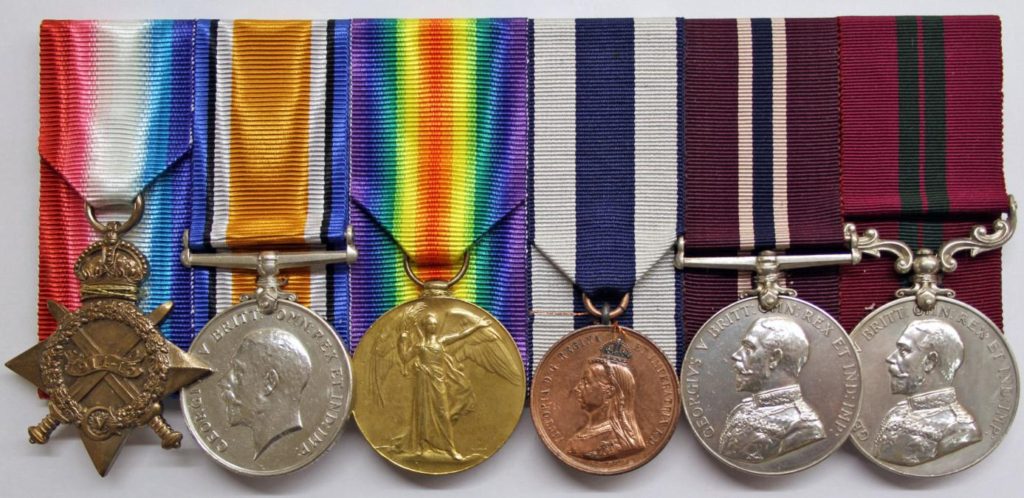
Description of the medals awarded to Jack Sloan from left to right.
1914/15 Star awarded for service in a war zone before the 31st December 1915 to all British Commonwealth navy and army personnel for WWI
British War Medal is a campaign medal awarded to all British Commonwealth navy and army personnel for WWI
Victory Medal was awarded to all navy and army personnel to commemorate victory at the end of the war.
Bronze 1897 Diamond Jubilee Medal awarded to all ranks below an officer that attended the jubilee in London. All officers received a silver medal
Permanent Forces of the Empire Beyond the Seas Medal (GV) awarded for 18 years long service and good conduct in the permanent forces army of the British Dominions and Colonies
Meritorious Service Medal (GV) awarded for 24 years exemplary service in the permanent forces army within the British Commonwealth
———–00000———-
The Letters.
The following letters where written by Jack Sloan to his family from Gallipoli and from various hospitals and locations he had been sent to for recovery and recuperation. They have been typed from the original letters by a family member. The letters are interesting from many perspectives as they give a first hand and observational account of the Gallipoli landing and an individual’s perception of the conflict. The rehabilitation process is also covered along with reflective comments on the nature of the war. Maybe younger family members could find the story and letters useful as part of a project, or a presentation to others, related to the ANZAC’s. As a note of caution, the letters contain some graphic descriptions of injuries suffered by some soldiers.
———–00000———-
A collection of letters from Jack Sloan to his family.
Letter Number 1.
Gaba Tepe – Firing Line *
22 / 5 / 1915.
Dear Jim
Received your two welcome letters, one from Canberra & the other from Randwick and as things in the lead line are a bit quiet this morning will endeavour to give you an account of our doings since leaving Egypt. We received a few hours’ notice to pack up & entrain at Cairo & soon were being rushed towards Alexandria where we arrived at daylight & soon found ourselves snugly aboard S.S. Lake Michigan, an up-to-date trooper.
The following morning, we found ourselves a nice harbour (& were told it was Lemnos) with a pretty shore clustered with villages. Here we stayed for ten days & practised landing in the ship’s boats. Every day brought fresh boats till one could count over 100 in the bay; it was estimated that the harbour ships contained over 100,000 men.
On the evening of 24th, we received our orders; The Australian Division were to land at *Gaba Tepe. The plan of landing was to be a surprise. The fleet of transports were to move to a position near the shore, four abreast, 300 yards interval & all lights out; at 8pm every light was switched off on deck & every porthole screwed below.
The 3rd Brigade were ahead of us, their boats were to be in position at 3am & were to land & endeavour to take & hold the hills that rise from a sandy shore. Slowly & silently into the gloom, this great fleet moved each ship in its allotted place; every man in his section ready for an accident or mine.
As morning broke, we heard the rifle fire of the 3rd Brigade who were carrying out their great purpose. Later, we saw plainly the hills of Gallipoli & a fleet of transports in their proper position, each guarded by a man-of-war.
Our regiment was selected to be the first to land in daylight. As day broke, the fleet bombarded a small headland, half a mile away. It was grand to see the Queen Elizabeth firing a broadside. This was Gaba Tepe Fort. They did not reply & everyone thought it was blown to atoms. We moved with confidence into our boats.
I was with the Regimental and Brigade Head Quarters, when about 300 yards from the shore, the fort opened fire, much to our surprise & shrapnel fell in all directions. One shell landed 10 yards from our boat, but best of luck – did not burst. We landed & moved up a gully, where we rested as reserves. I will now finish with the 3rd brigade.
When they landed, the Turks opened a terrific fire. The men in the first boats fixed bayonets & charged up the thickly wooded hill. Several boats stuck on a sand bank, the men jumped overboard & fell into deep water. A number lost their rifles, but that did not stop them. They simply drew their bayonets & charged with the rest; the Navy say this was the grandest feat of all & has earned for Australia a name that will last for centuries. On they went & did not stop till the top was reached & firmly held. The Turks simply went for their lives.
Page 1 of 3
Continued
A collection of letters from Jack Sloan to his family
Letter Number 1.
The position is like landing at **Chowder & securing George’s Heights, only higher & steeper. As we rested in the gully, hundreds were being brought down from the Heights, some of them terribly wounded. The beach was soon covered with a mangled heap of men who had to patiently wait till they could be taken to the Hospital Ship. The German gunners had by this time, got the range of the beach & began shelling with deadly effect.
We were ordered to reinforce the right of the line. We moved through a valley & were met by shrapnel & spent bullets. The line was reached & our men entrenched without much resistance. I was with Head-Quarters at the top of the gully. The following day, the memorable 26th, we received orders to advance. The whole division moved forward in one great line to a certain extent, we moved into a trap. We thought the Turks were on the run because their rifle fire was weak, but they had machine guns everywhere & plenty of artillery & they knew we had none.
On went the line in a mighty charge till we were brought to a standstill by machine guns & shrapnel. It was simply an inferno. Our men rushed into it with wonderful pluck & determination & must have impressed the Turks as they have the world. I was with the Colonel & Lieut Smith (Sig Officer). Everyone was ordered into the firing line. I went forward with him & soon machine gun played on us. Smith was soon wounded.
I collected a platoon and moved forward under a hail of shrapnel. We just reached the line when the retire was ordered. We got back to our trenches. I did not feel any fear. The desire was to go forward & shoot a Turk if possible. In the meantime, our Colonel had been shot dead by a stray bullet in the valley behind the hill. Lieut Smith bound up his knee, collected a few men & hoppled forward. He was soon spotted & shot. How I escaped, I will never know. Men fell all along the hillside. It was luck, pure luck. The night was fairly quiet & our men started digging & have used the pick & shovel ever since. We were a bit surprised to hear the Brigadier & Brigade Major had been wiped out.
There are two elements in the show that have caused a lot of casualties – Turkish Snipers & good German Gunnery. These snipers are good shots. They move up under cover of darkness, quite close to our lines & watch & wait for Officers. The Germans have spies everywhere & the ranging of their guns was grand. They open on a ridge & sweep it right along. How they get their information, we do not know; but they get it.
Nothing very startling happened till the 19th. The Turks attacked about 3am, but were beaten back. They made a great effort at 8.30am. Our men waited for them, cool and eager. On they came, with fixed bayonets. Rapid fire soon told & hundreds fell, never to move again. Our machine guns did great execution & piled them up in heaps. At 10.30, it was all over. The beaten Turk moving back to his trenches. General Bridges was wounded in the knee & has since died.
I have a good job as a Regimental Sargent Major and dish out the ammunition & hand grenades. Our men are dying, night & day, as also are the Turks. You must get underground. Modern artillery is so deadly. The Goeben has been sending a few “Jack Johnson’s”***lately & several have fallen fairly close to our headquarters. It is pretty to watch them burst. The earth is torn up for about 50 yards around. One caught three of the 3rd Brigade in a dugout & covered them in six feet of earth. Of course they were killed.
Page 2 of 3
Continued
A collection of letters from Jack Sloan to his family
Letter Number 1.
Our men have played the game in a wonderful manner & have surprised everybody; they have made good. The praise we are getting from the heads of the land is enough to turn our heads. The business of landing was a bit out of the ordinary. You have to go a long way back in British history to find a parallel.
The Navy has done great work. They were very cool in managing the boats & would have liked to land with us. One of their number, a Jack Tar**** made for a machine gun when the 3rd Brigade landed & which was playing havoc. He rushed up, knocked over the gun & detachment & was returning when he met his death. His next of kin will receive his V.C.
This little show has cemented the Army & Navy as never before. I am pleased to say, the brightest elements of Australia’s manhood has been brought out during the last few days. We have seen self-sacrifice displayed by men we never thought there was anything in. I witnessed a hard case being taken down in a stretcher with both his arms shattered & half his face shot away by a shell. He insisted that his stretcher be given up to a stranger & walked to the dressing station. Both died two hours later.
Trust Jim, you are all well & hope to see you, say, about Xmas. The risks here are heavy, but I have a feeling I will get through.
Jack
NOTE:
* Gaba Tepe which is a Turkish fort.
**Chowder Bay near Mosman NSW. Similarly, Georges Heights is close by.
*** “Jack Johnson’s” A ‘Jack Johnson’ was the British nickname used to describe a heavy, black German 15-cm artillery shell.
**** Jack Tar; an English term referring to seamen of the Merchant or Royal Navy, particularly during the period of the British Empire.

Jim Sloan
Jim Sloan (1888 -1948) was the youngest of the Sloan siblings. This is a photo of Lieutenant Jim Sloan in 1915. Jim Sloan was 27 and recently appointed an Area Officer based in regional NSW. This position is usually filled by a lieutenant, and appears to be a studio photo. Perhaps it was taken at the time of his commissioning in 1915. Jim died in 1948, as a result of an accident, when he fell off a scaffold, at the construction site for the Hay War Memorial High School.
Page 3 of 3
A collection of letters from Jack Sloan to his family
Letter Number 2.
Firing Line 28 / 5 / 1915.
Dear Nancy
Your nice letter received in the firing line & read in deafening rattle of about 100,000 rifles. We are still holding onto the now historic heights & we expect to be here for about a month. I am still sound & well & hope to escape the bullets & fragments of shell that scatter around the area in which we exist as we are not living as we generally know it. Since last writing, there has happened two items of interest. 1st – Six hours armistice. 2nd – The sinking of the Triumph. The enemy asked for armistice to bury their dead that fell on the 19th inst. We ceased fire at 7.30am & a party moved out & exchanged the dead at a point midway between both lines. We found the enemies casualties were much more than our own & heavier than we anticipated. Our chaps had some fun with the Turks – exchanged cigarettes & badges & they said they were surprised as their German Masters had told them we were black fellows who would give no quarter. They say they don’t like the war & will surrender if opportunity offers. I had a good look at the battle field & it was a terrible sight. In some places, the dead lay thick & were sickening to look upon. It was 6pm before the Turks finished their work. We finished ours in about two hours. The other day, just as we were about to have our dinner, some of the reserve shouted out the Triumph is torpedoed & we ran to the bank & saw a number of small craft racing to her assistance. We watched her slowly go down & as her deck touched the water, there was a plunge forward & she disappeared in a calm sea 20 minutes after being hit. Several destroyers raced away to try & ram the submarine, but the wily German or Austrian was not seen. This submarine was seen in the morning & every lookout was kept, but without avail. 167 Lives were lost – mostly stokers. We were very sorry as the crew were a fine lot & did good work in our landing. We have just received a file of the London Press & they boom us up to the skies. I suppose the dailies of Sydney have some big type about our wonderful doings. We certainly have done some work & of course paid for it too.
How is your class getting on? We do not care much about the light fantastic in the trenches, but hope to make the Turks & Germans dance the next time we meet them. The weather is very bracing. This is a terrible place in wet weather – sticky soil. You must excuse this scribble, as I have to go for my life in the few minutes at my disposal.
Trust you are all well. Tell Mother not to worry as I will be OK. I feel I will return to you all again. I can’t get killed after living through the great charge on the 26th. Trust to hear from you soon. Please send this copy to Alice as hers may not get through.
I remain. Your loving Bro. Jack.

Agnes (aka Nancy) Sloan (1880-1966) was the 4th sibling in the family and lived with her Mother and Father John and Isabel Sloan until approx. 1920. She ran Dancing Classes in the large “Parlour” of the Sloan’s home in Centennial Ave Randwick. At these Dancing Classes the McLennan Girls became partners for “teaching” local boys dancing. It was at these classes that Isabel McLennan and Mervyn Donaldson met. Aunty Nancy, as she was known, married a farmer George Rudd from Inverell in 1921. Unfortunately, Nancy had no children; however, she adopted a girl whom she named Judy. This picture of Nancy and Judy was taken in approx. 1930.
Page 1 of 1
A collection of letters from Jack Sloan to his family
Letter Number 3.
Firing Line 31 / 5 / 1915.
My Dear Mother
Your ever looked for letter to hand, also one from Alice, Emily & Jim. We are still holding on & very little has happened since last writing. There has been a few small attacks on our left flank, resulting in casualties. We have lost a few each day. Last night, two of our Brigade were killed & buried at 8am this morning. The enemy got the range to a point in the valley & men going to the beach have to run the gauntlet for about 20 yards. I had to proceed to the beach on duty & as you rushed past, the ping ping of bullets caused us a little excitement. They wounded about 15 men at this spot one day this week & are now making a trench. Time I think; I met Ashley McCann yesterday. He has been here a week & looks well. They are in reserve.
Alice* wrote to say Charley** had had the misfortune to cut his lip. She seemed much concerned, but I feel will only leave a scar which is nothing in a boy. The weather still keeps warm & bright. We are all watching an aeroplane gliding gracefully along about 300ft up. It is looking for a submarine; those subs play havoc if they get the chance. Yesterday, we watched one of the planes dropping bombs on the Turkish trenches. They got one & as they climbed out, our machine guns felled few, never to rise again. Several of our officers who were slightly wounded returned to us today. Also reinforcements (officers) who will fill vacancies & prevent those who have stood the test & burden of the day well-earned promotion. I was expecting to receive a commission but what social influence, returned officers & reinforcements, there is very little hope. There may be a chance after the next great advance for some of the Non Commissioned Officers. Yesterday Divisional Orders showed nearly all the NCOs of the 2nd (Victoria) promoted to Commissioned rank; they lost very heavily nearly all their officers being killed. There is a great account of our landing in the London Daily Mail of May 7th. It would be nice if you could secure a copy. I can just imagine the multitude that look in the morning papers, now that there is something doing. Every state will have its roll of honour. Some a bit heavier than others. If we advance from here you will receive another shock. I think we will hold on here till the Turks surrender. It is only a matter of a few weeks till they are hemmed in. I am kept very busy. There are lots of fatigue parties to look after, bringing stores from the beach & guards to be furnished. Everyone stands to arms from 3am to 5am & I never get to bed till 11pm, so am beginning to feel a bit weary. The men in the trenches really have the best times. Now my dear Mother, I will draw to a close. Trusting this finds you all well and don’t worry as I will be alright. Your Loving Son, Jack.

Jack Sloan aged approx. 14 with his sister Emily Sloan aged approx. 18
Page 1 of 1
A collection of letters from Jack Sloan to his family
Letter Number 4.
Firing Line 11/6/1915.
My Dear Mother,
There is very little change since my last writing. We are still waiting patiently for the Turks to make another advance, but they are also playing a waiting game & in consequence, there is very little doing. The Germans fire a series of shells during the day, but very little damage is done. Our artillery returns the salute with varied success & so the game goes on. We lost one man this week – shot dead through a loophole of the trench. The men are getting quite used to living in the trenches. They take their turn observing, while their comrades sleep in a dugout, quite safe from shot & shell. The reserves in rear do all the fatigue & are kept busy carrying water & stores from the beach which is no easy task. The beach at times is like Manly on a holiday – only with the absence of women. Besides the busy army of carriers, there are about 10,000 men always bathing. I managed to get a swim twice a week, which is very refreshing. We hear very little war news. Rumours about peace come along every day or two, but we take very little notice of them. According to English files to hand, we don’t seem to be doing too well, just holding our own. That is all. The health of the troops is good & I am feeling splendid. I suppose there is great excitement in Sydney about our doings & you will be all wondering what will happen when we make our next advance. If we do, there will be plenty of copy for the papers & many saddened homes. Three of our Officers who were wounded on the 26th returned in this Battalion. It is a case of the fortune of war. The majority of ours were only slightly wounded while the Officers of other Battalions were killed. The weather is till nice & warm. I am dreading the cold, but I think the show will be over before the winter. A mail is expected tomorrow & we are anxious to receive it. Don’t worry about me Mother. I will be alright. Tell Emily & Jim I will write as opportunity offers later. Envelopes are very scarce. Trust this finds you all well & trusting to receive a good mail tomorrow.
Jack.

Jack Sloan has written this letter to his mother Isabella Sloan (1850-1930). She was born in Inverness, Scotland and came to Australia as a baby in arms. She married at age 19 to John Hannibal Sloan, in Albury, in 1870. She had 8 children and the mother of the brothers and sisters Jack mentions in these letters. This Photo was taken in 1923.

John Hannibal Sloan (1841-1919) was Jack’s father. In 1859 his family arrived in Melbourne to seek a fortune on the gold fields. This failed and they settled in Molesworth as farmers. At various times John Sloan was a miner, a farmer, a shearer and a builder. He was the father of Isabella’s 8 children.
Page 1 of 1
A collection of letters from Jack Sloan to his family
Letter Number 5.
Firing Line 14 / 6 / 1915.
My Dear Mother,
Mail arrived yesterday & pleased to receive letters from you. Alice* & Jim & to learn all are well. It is nice to know Charlie’s** lip healed up & that Nancy’s dancing class has commenced the season under favourable conditions. If you continue to send more of your youths away, Nancy will have to announce Ladies twostep & teach the ladies to take the gents’ part***. I also received some papers. Everyone rushed for the papers, but were disappointed at the meagre details published. The authorities mean to break the news to you gently. They publish about 20 names when they should have published 3000. You all must know sooner or later. We are still in the same place. Hardly firing a shot – both parties playing a waiting game. A few men are killed every day. We lost 3 yesterday, shot dead through the loopholes as they took their turn observing. The artillery exchange shots three or four times a day with varying success. I am a bit run down & will likely be sent to Lemnos, a small island handy for a few days’ rest. Don’t worry, I have done my duty & worked hard with good results to this Battalion, but have had to battle for my life like a lot of other members of the staff in regard to promotion. We have all been turned down. It is impossible to believe that political wires are being pulled in Melbourne & every male C.O. are worried with communications to find commissions for some social gun serving in the ranks who has no experience in leading men. Australia is paying the price in good red blood of those that left her shores. It trickles down the trenches & the sacrifice is laid to rest covered in four feet of Gallipoli soil. Mounds of earth are seen in the terraces made along the hillside. The deep, blue historic sea looks cool & beautiful in the distance. We stand & watch the ships steaming over its surface, calm. Destroyers darting here & there to sight the deadly submarines that are continually watching for our battleships or troopers. The gully is a busy scene as thousands of men carry up supplies of food, water & the great variety of war munitions. The whole scene forms a pretty picture. During the day when all is calm & peaceful, a sharp crackling sound is heard. The first of a series of about 12 shells that the Germans fire at regular intervals. The regular British soldier takes cover till the series ceases, but our boys laugh & move forward quite unconcerned. We soon know if anyone is hit by the familiar cry “stretcher bearers wanted” & so the days pass by & it is here that under a sunny sky, Australia’s youths are laid to rest in many cases, the result of a political & social system we thought was dead. If I get to Lemnos for a spell, I will have a new Censor to deal with, so may not get letters through as in the past. Now my dear Mother, I will draw this letter of my feelings to a close. I have never met the young chap who wrote to Mrs Young about poor May. I feel very sorry for them, as I always had a great regard for the Young family. Ashley McCann is here & well. Tell Jim I will write to him later. I am very pleased to receive his humorous notes. I cannot write to you all, so this will have to do for the family this time.
Jack.
Note: *Alice Sloan: Alice is Jack Sloan’s wife who was living at this time in Centennial Ave Randwick, with her three sons, John aged 8 years, Charles aged 5 years and Douglas aged 3 years. Other members of the Sloan family lived close by.
** Charlie: This is Jack Sloan’s son Charles Lindsay Sloan (1910-1947)
*** Dancing Class: Jack Sloan’s sister Nancy ran Dancing Classes in the large “Parlour” of the Sloan’s home in Centennial Ave Randwick.
At these Classes the McLennan Girls, including Isabel, Jessie and Sheila, became partners for “teaching” local boys how to dance.
Page 1 of 1
A collection of letters from Jack Sloan to his family
Letter Number 6.
S.S————- Mediterranean Ocean 18 / 6 / 1915.
My Dear Mother,
I have been feeling a bit run down lately & the Medical Officer ordered me to Lemnos for a change, but as there was a boat leaving for Alexandria. I pulled the strings & managed to get aboard the above beautiful Trans-Atlantic Liner, 14000 tons & am now enjoying every comfort, as we glide along this sunny sea. It is simply lovely, so bright & bracing. What a transformation to the Firing Line I left yesterday. They are very kind to me. I have a lovely cabin. We expect to reach Alexandria tomorrow & I will go to one of the many hospitals lately established there. I mean to have a good rest. There are hundreds of single men at the base who have never seen the Firing Line & it is up to some of them to take a turn. Don’t worry about me, as I am only run down & well cared for & safe from shot & shell for a while. I must have nine lives. I had the most narrow escape yesterday; I was waiting at Clearing Station on the beach for the tug to take us off, when a shell burst just above me & caught an Army Medical Corp Man full in the chest. He fell & never moved again. We made for cover & just as we got behind a sand bag, another came & wounded an Officer. We crouched till the series of ten were fired without further mishap. The Firing Line with its streaks of blood & deafening artillery is like a dream to me now that I am reposing on a comfortable deck chair. I am feeling better already. Our boys are up against a big proposition in Gallipoli & the Roll of Honour will be considerably increased before the end comes. (We have aboard 300 French Cavalrymen). They look very picturesque in their red pants & blue jackets. (They are returning to Egypt as there is no use for horses in Gallipoli yet.) The Captain is a jolly old man & keeps us laughing, telling funny yarns. The Crew are a happy family, very different from the “Euripides”. It is nice to sit here & watch the seagulls as they flit hither & thither & to think of the great history that surrounds this portion of the world. I wish you were in this boat taking a Mediterranean cruise with its long promenade decks & easy chairs. She brought Army Corps Headquarters 2000 men & now she is going to Alexandria with over 300 men to load stores. So you can see there is plenty of room. I suppose the papers are full of our doings & everyone will be scanning the Casualties each morning. Trust this finds you all well & hope to come out OK.
Jack
Page 1 of 1.
A collection of letters from Jack Sloan to his family
Letter Number 7.
General Hospital, Alexandria
7 / 7/ 1915
My Dear Nance
I have been feeling a bit run down lately & the Medical Officer ordered me away for a change & I managed to get to the above fine institution where I am well looked after. I have been booked for Cyprus, that little island where St Paul spent several years of his life. Dada will be able to tell you all about it if you do not know. Yesterday, the Cyprus trip was cancelled & I am now to proceed to England for convalescence – not too bad is it?
The boat sails this week. The authorities are sending as many away from here as possible to make room for more wounded coming from Gallipoli. There has been an advance of a few yards with ordinary results. How is your dancing class getting on? I trust you have had a successful year. I hope Mother received all my letters about our landing on the 25th April, also the terrific bombardment on the 18th May & our advance on the 26th April & attack on our trenches on 19th, which was so easily repulsed with such great loss to the Turks (6000) killed, the sinking of the Triumph & the Armistice for burying the dead. In case you did not get it, Ashmed Bartlett’s* account as published in the papers is as accurate as you can get it. We have just received word that our Adjutant Lieut Massie,** the cricketer is wounded. I notice there has been a bit of a stir in Melbourne about scandals in New Guinea. One dare not mention the scandals carried on here, as they would be too terrible for the censor to pass. This is a fine hospital & is run well & efficiently. It was the Abassiah Schools planned by Kitchener & he evidently had in mind it being used for a hospital someday. It is said to be built on the site of the ancient world famous library where all the great professors of Greece used to come to read & study. From the roof of this building, you can see Cleopatra’s Garden, where Anthony used to come & court this queen of history. It is interesting to watch the people of this great city, perhaps the most cosmopolitan in the world. It is a long time since I received any letters from anyone & it may be sometime before I receive any now that I am booked for England.
Jack.
NOTE:
*Ashmed Bartlett:Ellis Ashmead-Bartlett (1881-1931) was a British war correspondent during WW1. His reporting from Gallipoli was instrumental in the birth of the Anzac legend which dominates Australian & New Zealand history. His criticism of the conduct of the campaign by the British was instrumental in the dismissal of the British Commander, which eventually resulted in the evacuation of forces from Gallipoli by December 1915.
** Adjutant Lieut Massie: Robert (Jack) Massie NSW Cricketer 1912-13 season and prominent all-round sportsman. His Father was Cricketer Hugh Massie who played 9 Test Cricket Matches for Australia in the 1880s.
Page 1 of 1
A collection of letters from Jack Sloan to his family
Letter Number 8.
General Hospital, Alexandria
14 / 7 / 1915.
My Dear Mother
Very pleased to tell you that I am getting along well & hope to get away to England this week. It will be much nicer than going back to Gaba Tepa. I hope to join some British Regiment where Labors Military influence is not seen. There is nothing startling here; a few hundred wounded came in the other day, who keeps the nurses & doctors busy. I have been reading some Sydney mail to hand with their pictorial Honour Lists & accounts of our doings in Gallipoli. They are fairly accurate. Beans* are more accurate, if not so graphic as Ashmead Bartlett’s. It seems a long time since I received any letters from anyone, but cannot expect to have any till I get to England now. Life in hospital is dull. An occasional concert is arranged. A few French & Italian girls come along & sing in their native tongue. Several of the nurses have good voices & help things along. The weather is still delightful – warm days & cool nights. There is very little war news. The Australian press seem to publish more than the British. The end of the war is a long way off. The German Army is officered by men of mature ages & the honour of the nation is placed before political patronage. Many Australians will be sacrificed before the end comes. Under the present system, the toll must be heavy.
The only hope I can see, is when the blood stream runs so high, that the people of Australia will wake up to the fact that something besides German & Turkish bullets are the cause. Then will they decide to sweep away those who placed boy officers in command. Fancy majors under 21 years of age. I would willingly sacrifice my life, if by so doing, the boy officer would be removed from modern warfare. The Labor Party stand condemned by every law of God & man. Australia does not know the truth. The papers have not published one half of the killed. Perhaps they have been published in later issues. Don’t worry about me. I will be alright.
Trust all are well and hope to receive a letter C/o High Commissioner, London.
Jack.
NOTE:
* Charles Bean was an Australian World War I war correspondent and historian. Bean is remembered as the editor of the 12-volume Official History of Australia in the War of 1914–1918 and was instrumental in the establishment of the Australian War Memorial, and the popularisation of the ANZAC legend.
Page 1 of 1.
A collection of letters from Jack Sloan to his family
Letter Number 9.
Mediterranean Sea – S.S.Wendella
24 / 7 / 1915.
My Dear Mother
After a few false starts, we find ourselves aboard the South Australian Steamship Co. Wendella, one day’s sail from Gibraltar. We have had a lovely voyage. So far, calm & cool & nearly everyone is in good spirits & feeling well. I am splendid & wish you were here to enjoy the experience of a trip towards the Homeland. I hope to have a good time & leave Gallipoli to the tender mercies of the politicians. We have about 1,100 aboard. Men who have been slightly wounded & slightly sick like myself. There are representatives from nearly every country in Great Britain, besides every state of the Commonwealth & New Zealand. It is very interesting to talk to them as they relate their adventures in land, in the charging & in the trenches. Scotchmen from the highlands, Welshmen from the mountains & Englishmen from all parts – London, Lancashire, Manchester & Irishmen from away down. Each speak a different language, it seems, but all are loyal to the cause. We will be striking England in a good time, about bank holiday & should have a month of good weather. The men on board tell some good stories about these country men. Many collect badges & buttons of various units. One man was going round quite seriously asking if you had a two shilling piece, as he was collecting them. Needless to say, he was a Lancashire man.
Now my dear Mother, I will draw to a close. Trusting you are all well & hope to write about London in my next letter.
Address: C/o High Commissioner, London.
Jack.
Page 1 of 1.
A collection of letters from Jack Sloan to his family
Letter Number 10.
General Hospital, Harefield Park, Harefield, Middlesex.
2 / 9 / 1915.
Dear Mother
I am settled down nicely at Harefield Park & have an easy time supervising the orderlies & showing visitors round the huts. A concert party comes from London nearly every day & we hear some of the best artists. Madam Amy Sherwin brought some fine talent out yesterday & gave the boys a treat. Mrs Churnside entertained the Victorians to afternoon tea on the lawn & Sir George Reid made the men laugh with a few jokes. They are gathering all the Australians from the various hospitals & bringing them here for treatment. As the men recover, they are sent to the convalescent home at Epsom, where they are kept for six weeks & then forwarded to the Base at Weymouth, where they are drafted at intervals to the front. The weather is getting cold, but I do not feel it as much as I expected. It will be very hard for the men in Gallipoli during the winter months. Yesterday’s papers brought the sad news that Major Davidson has been killed in action. He was one of the finest men on our staff & never altered a bit from W.O to Major. He proved himself one of the most capable officers at *Gaba Tepe, and if anyone should have received the D.S.O, it was he. The war goes on & casualties’ lists after lists come along, but the people here don’t seem to care what goes on. Thousands of people are making fortunes out of the War & hope it may continue for years, as long as the other fellow does the fighting. There is great agitation for compulsory training all over the country. The people are getting tired of looking at other hundreds of thousands of able bodied men walking about the Strand & other parts of London who talk that we are going to fight to a finish & see the business through. The people want waking up. You hear yarns about the great rush of recruits coming forward. I say they are not coming forward. I have visited several of the large recruiting depots at Whitehall & other parts of London & all I saw was a few deadbeats. Very poor material for soldiers indeed. I think compulsory training must come before long unless Germany gets a setback which looks very unlikely at present. I hope to run into Windsor occasionally & see the Jamisons. They are very homely people & make me very welcome. They are very anxious about their son, who is somewhere in France. It seems a long time since I received a letter from anybody. Last received on 5th June at Gaba Tepe, but expect to get some soon. I trust all are well & that you have not allowed this war business to worry you. Through the war, I have seen the wonders of Egypt, England & Scotland & seven weeks of real fighting & reckon that is worth something in one’s lifetime. War is the finest thing in the world & people here were never better off in their lives. Everybody getting good wages, when peace comes, there will be a slump & lots of people will be out of work. So let us hope peace will not come too soon.
Jack.
NOTE:
* Gaba Tepe: Part of the area where the Australian Army landed. (See Map)
Page 1 of 1
A collection of letters from Jack Sloan to his family
Letter Number 11.
91A Waterloo Rd, London, S.E.
29 / 9 / 1915
Dear Mother
I am waiting for a boat & hope to get away by one leaving about the 4th of next month. I think it just as well to come home when I have the chance. Hundreds of poor fellows are returning who should be pitied. They are trying to make the best of things with one leg or arm. I received a note from Hab* this morning. He says he expects to get a Commission & will try his luck. He is taking a risk, but I suppose he feels like I felt – that a soldier must take a hand in this war. I will always feel proud that I was through the thick of it even if I hate with a German hate the rotters that I was unfortunately associated with. The other day, I was shown all over the Times**. It is a great place & they have a fine lot of machinery for turning out London’s greatest paper. It was very interesting indeed. Yesterday, I took a bus ride to the Crystal Palace*. It is not open to the public now, being used as a naval depot. It is a huge glass & the gardens around it are very fine.
The weather has been beautiful, but today it is raining & cold. London is a nice place when the sun is shining, but I should not like to spend a long winter here.
Next Saturday, there is to be a great recruiting rally in London & if the slackers do not turn up; the people are going to ask the Government to bring in compulsory service. I would like to round up some of the Piccadilly urgers. They talk about Haw Haw**, what we are doing at the front.
London is dumb with joy at the recent victory in France. They grasp at a straw. People are wondering here what Australia is going to do losing so many men. The women here are filling the places in the post offices, banks, railways – in fact, they are doing men’s work except navying. The women are very enthusiastic about the war & have no time for a man not in khaki. There was great excitement over the recent Zeppelins raid* on London. The papers made light of it, but the damage was not far short of a million pounds. Trust you are all well & hope to see you all soon. Your Loving Son Jack

*Hab: Hannibal (Hab) Sloan (1871 -1945) was the brother of Jack Sloan. Hab Sloan served during WW1 in Europe. He was appointed to the rank of Major during WW1 and served with the 30th Battalion. He was also in charge of the training Battalion in Salisbury. After the war, he published a book, “The Purple and Gold”, a history of the 30th Battalion and the Battalion’s engagement on “The Western Front”.
NOTES:
**haw-haw:Alternative form of ha ha (“laughter”) (sometimes suggesting an upper-class British accent)
** The Times:The Times of London” was a leading English newspaper.
*** Crystal Palace: Variously a Building, a suburb and a Football area.
****The Zeppelin Raid:On the night of 31 May, 1915, a single German zeppelin airship appeared over North London and began dropping its deadly cargo on the darkened streets below. This was the first time that London had been bombed from the air.
Page 1 of 1
A collection of letters from Jack Sloan to his family
Letter Number 12.
91A Waterloo Rd, London S.E
5 / 10 / 1915.
My Dear Mother
I was so pleased to receive your letter dated 16th August today. Also, one from Alice & Jim & to learn that you were all well. So Jim is an Area Officer at last. He is in a good area & should get along alright. I am very pleased that Hab is getting a Commission. He has worked hard for it for years & now in a time when a little military experience means the saving of thousands of lives. The Labor Party could climb down from their aristocratic pedestal & give the labourers a show. Perhaps the roll of murder is beginning to prick their conscience. I expect to leave by the “Suevic” on Thursday. She is sailing via the Cape and if all goes well should be in Sydney before Xmas. I got a surprise the other day. A telegram from Mrs Asquith* to come to lunch 1.30 today. The Treasury have accepted the invitation & expect to have the honour to dine with England’s great Prime Minister. I called about a week ago & the Secretary told me to write, which I did. Will tell you how I go this afternoon. Jim told me to have a look around several places in London. I have seen a great deal of this great city & have had a twelve month experience that many people do not get in a lifetime. I feel it a bit hard to have to return without promotion, which I have worked hard & ran risks for, but will always feel the satisfaction that the wasters can do no more harm. I could stay here loafing about the base with no chance of advancing, whereas I may get a chance to return after the winter. The new Lighting Law for London came into force yesterday. The great city is pitch dark at night. All lights out & blinds drawn to every window. People feel their way along the streets & many that venture out after dark will have to be careful not to get lost. Now my dear Mother, I trust this finds you well as I am splendid at present.
Your Loving Son, Jack.
PS. Just returned from lunching with Mr & Mrs Asquith. I was placed next to Mr Asquith & talked to him for about 2 hours. He is a nice old gentleman & yarned about Australia & the war & other things. Mrs Asquith is a homely Dame & made me very welcome. Also, Miss Asquith, who is just recovering from a severe illness. The State Rooms are very fine. Mr Asquith asked me to drop in at any time for lunch, but of course, I will not have the opportunity again. I feel proud to have had the honour of dining with England’s great Prime Minister & will long remember the occasion.*** Mrs Asquith introduced me as a relation, but did not ask for any particulars or details. I was made very welcome & had a good time.
Jack.
*Mrs Asquith: The Wife of the British Prime Minister.
** Prime Minister Asquith: Generally known as H. H. Asquith, was a British statesman and Liberal politician who served as the UK Prime Minister 1908 to 1916. Asquith took Great Britain and the British Empire into the First World War .In 1915. His government was vigorously attacked for shortage of munitions and the failure of the Gallipoli Campaign. Lady Asquith was his wife.
***https://en.wikipedia.org/wiki/Charles_Tennant
Lady Asquith (Born Emma Margaret Tennant) was the daughter of Sir Charles Glow Tennant (1823- 1906). Sir Charles Tennant was the grandson of Charles Tennant (1768-1838) a Scottish industrialist who discovered bleaching powder and founded an industrial dynasty. Charles Tennant had the original idea that a combination of chlorine and lime would produce the best bleaching results. He and some partners worked on this idea which proved to be effective, inexpensive and harmless. He was granted a patent in 1798 and then developed bleaching powder in 1799.He built a factory outside Glasgow which became the Rollox Works. Charles continued to expand his horizons and bought out his partners. During the 1830s and 1840s he had the largest chemical plant in the world. He also worked on the idea of using rails to transport goods and was mainly responsible for getting a railway into Glasgow despite opposition from canal proprietors. Never one to overlook a sideline, Charles Tennant decided he must not forget the waterways. In 1830 he started the son of his younger sister Sarah Sloan (nee Tennant), William Sloan, with some small schooners. He saw this as a way to control the transportation of chemical products to nearby markets. At the time of Sloan’s death in 1848 they had the largest fleet in Glasgow, running nineteen vessels. By consanguinity: Lady Asquith (Emma Margaret Tennant) and Jack Sloan were third generation cousins.
Page 1 of 1.
The Descendants
of
John Hannibal Sloan and Isabella Whyte
John Hannibal Sloan (1841-1919) Married Isabella Whyte (1850-1930) and had 8 children
1.Hannibal (Hab) Sloan(1871-1945) m.Martha(Fan)O’Donnel (1873-1941)
1.Edith Sloan (1902 – 1990s)

2.Catherine ( Kate )(Sloan) McLennan (1872-1945)m Alex McLennan (1868-1945)

- Alexander John McLennan (1899 – 1899)
- Isabel Sloan (McLennan) Donaldson (1900 -1970)
- Jessie Ann Finlayson McLennan (1902 -1987)
- Alexander McLennan (1904 – 1991)
- Sheila Agnes Rose (McLennan) Cleary ( 1906-1991)
- Donald Ian McLennan (1909 – 1991)
- Jean Amy (McLennan) Jacups (1911 – 1997)
- Norman Eric McLennan (1913 – 1958)
- Joan Ivy May (McLennan) Davidson (1916 – 1972)
3. Emily (Sloan) Horne (1876 – 1958) m. Arthur Horne (born 1876).
1.John Horne ( 1914 – 1960 )

4. John (Jack) James Sloan (1878-1961) m. Alice Ridd (1878-1944).
John Hannibal Sloan (1907 – 1972)
Charles Lindsay Sloan (1910 – 1947)
Douglas Luton Sloan (1912 – 1977)
Sidney Wilson Sloan (1918 – 1956)

5. Agnes (Nancy) (Sloan) Rudd (1880-1966) m. George Rudd (1880-1949)
1. Judy Rudd (1929 – 1980)

6. Isabella (Sloan) Martin (1883 – 1963) m. John Martin (1882 – 1958)
1.Annie (Martin) Townsend (1913 -1972)
2.Dorothy (Martin) Diamond (1915 -1975)
3.Elsie (Martin) Burgess (1918 -1962)

7. Georgina Sloan (1885 – 1885) Died in infancy.
8. James (aka Jim) Sloan (1888 -1948)

Documents from The War Records
Of
John (Jack) Sloan
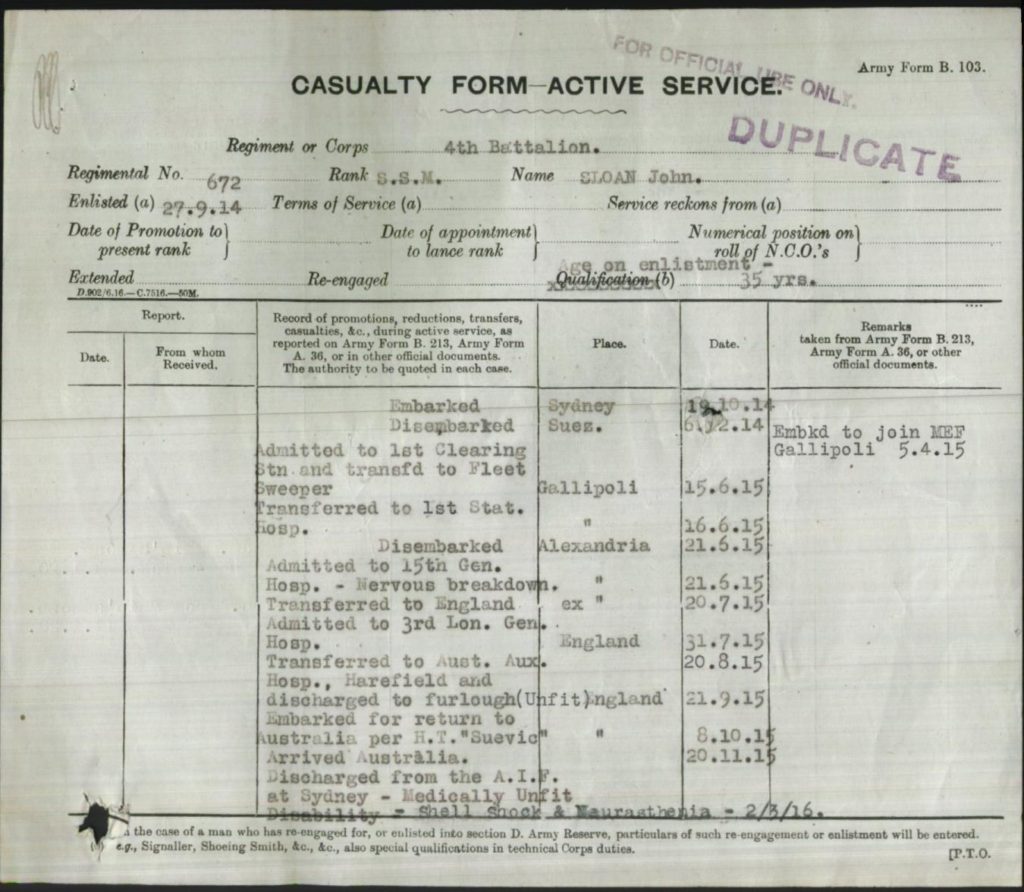
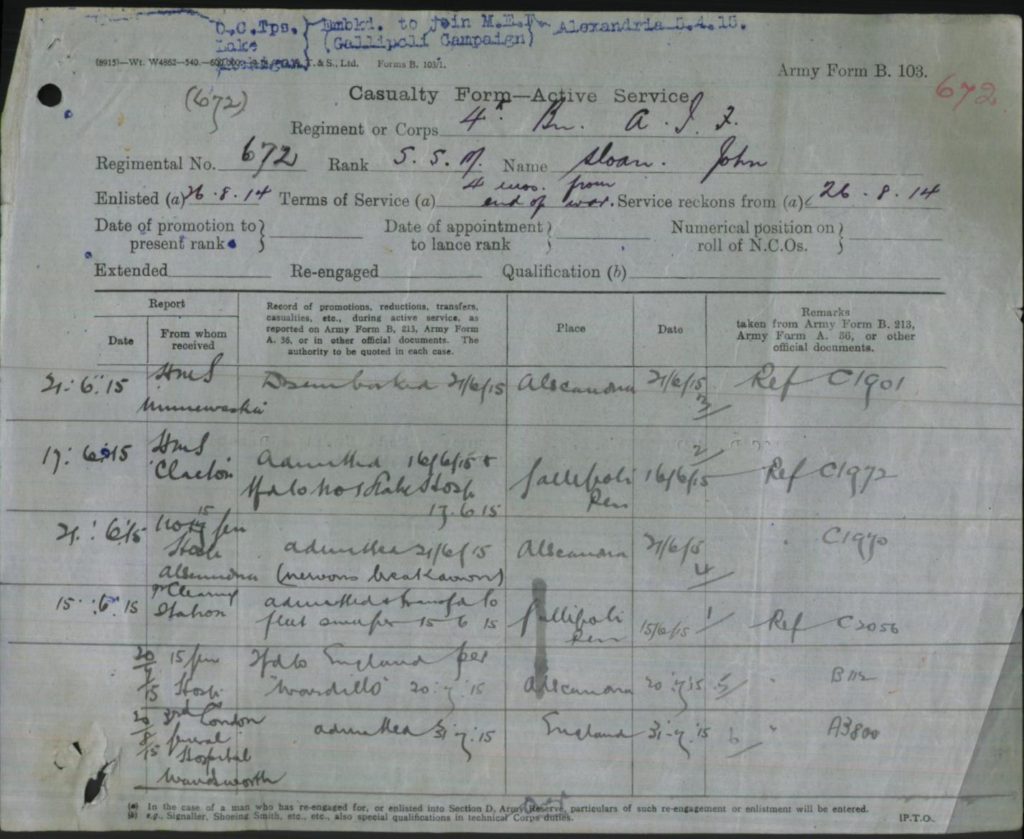
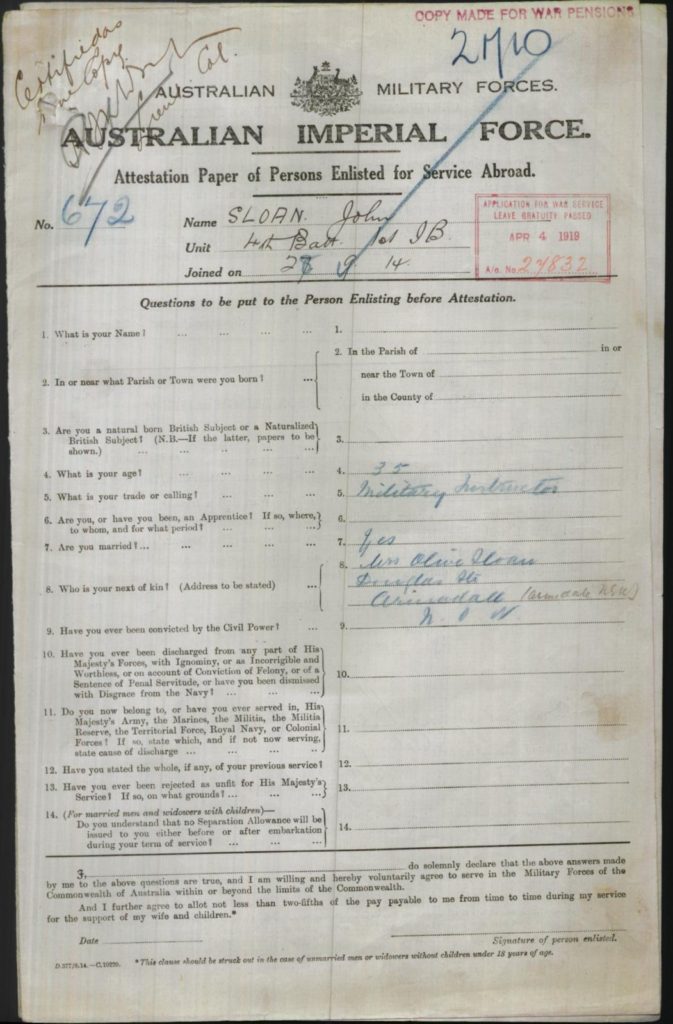
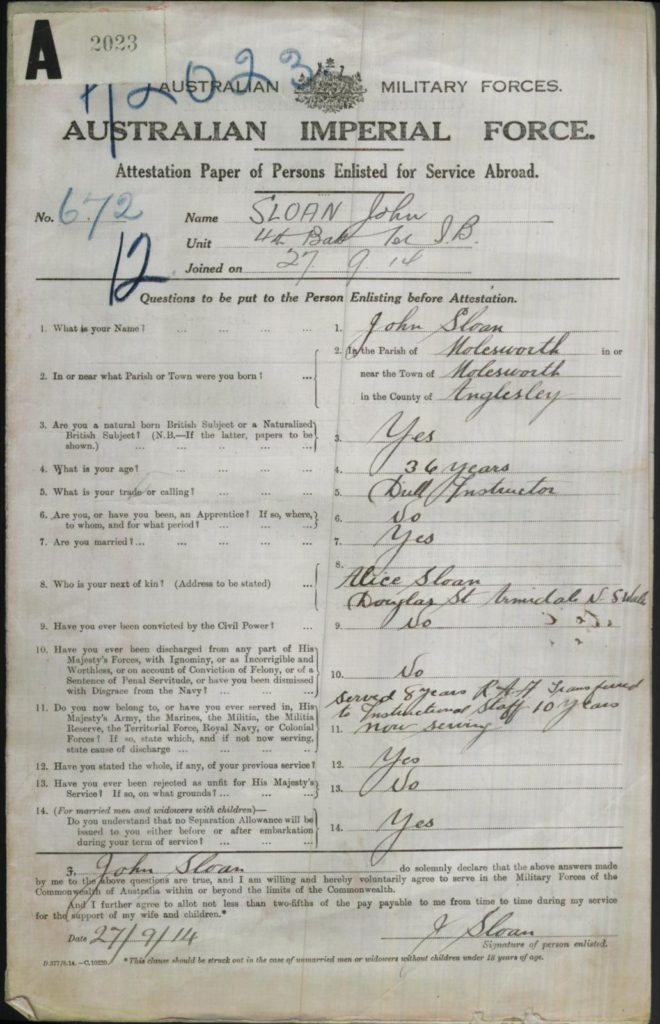
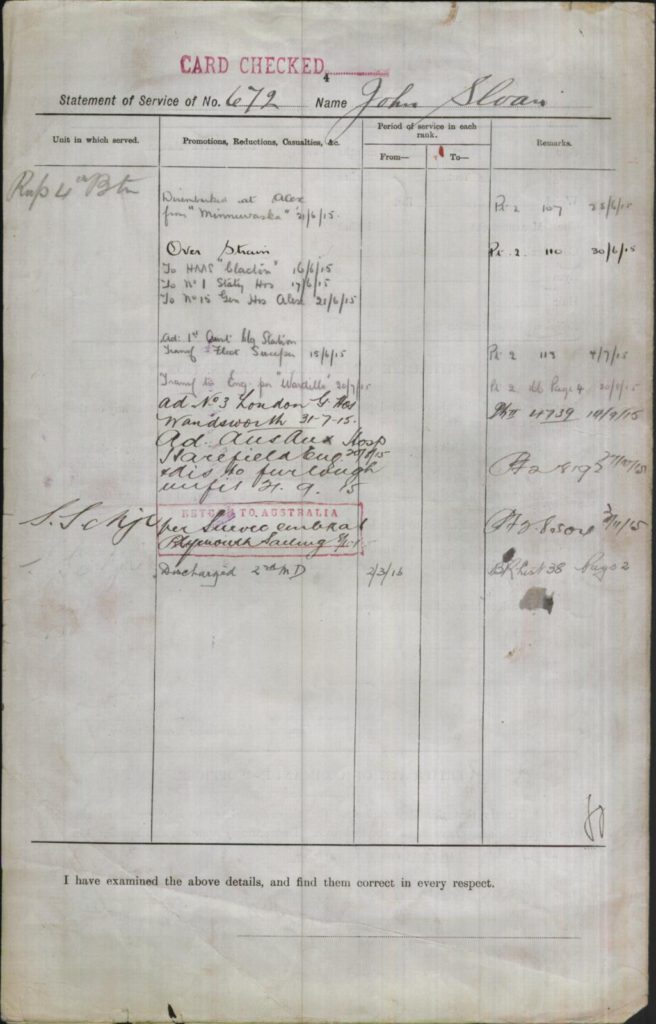
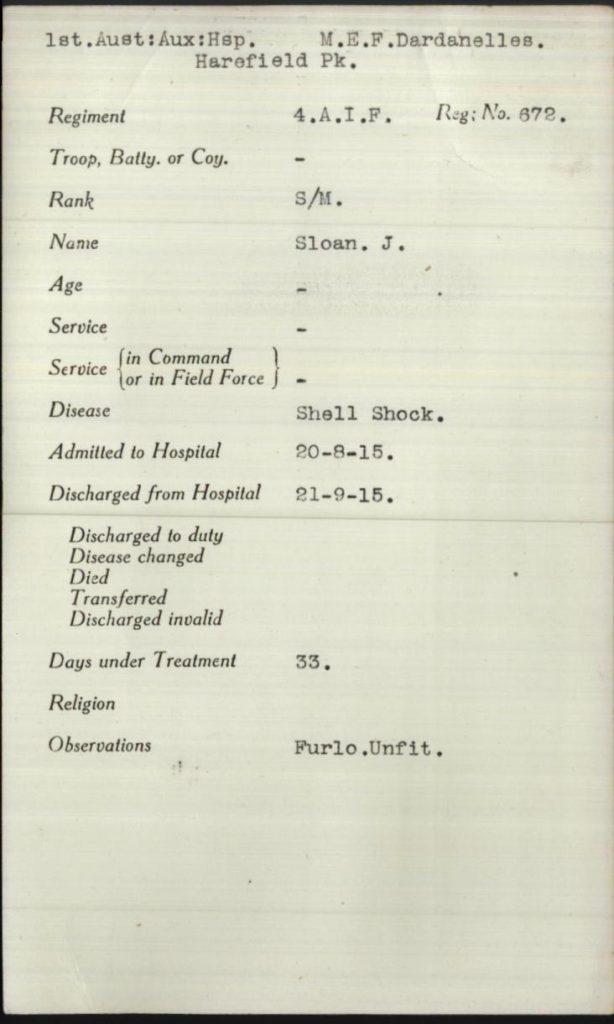
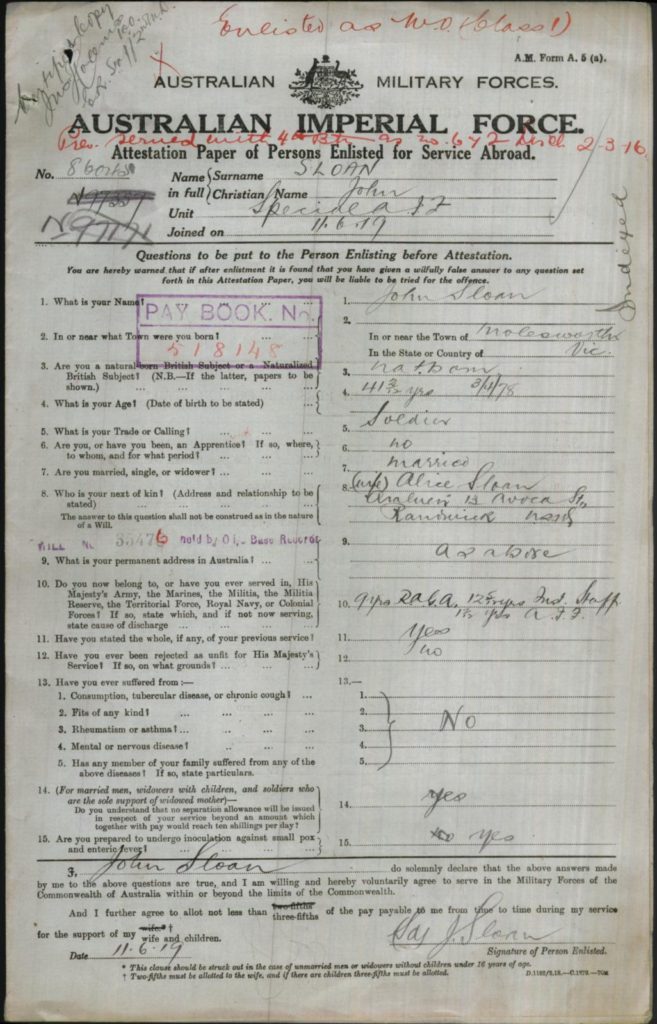
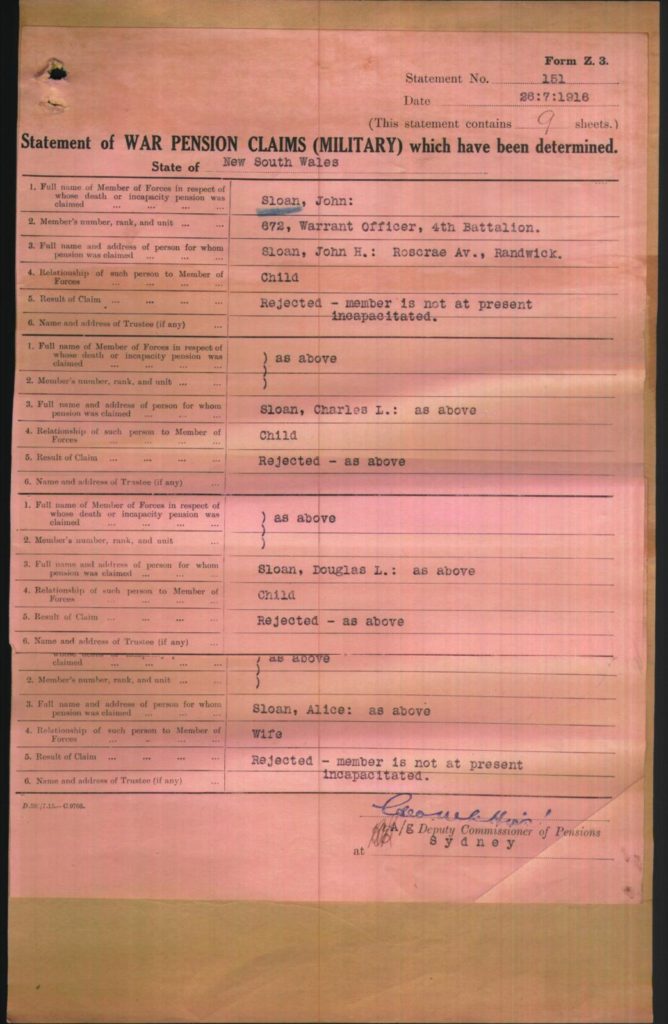
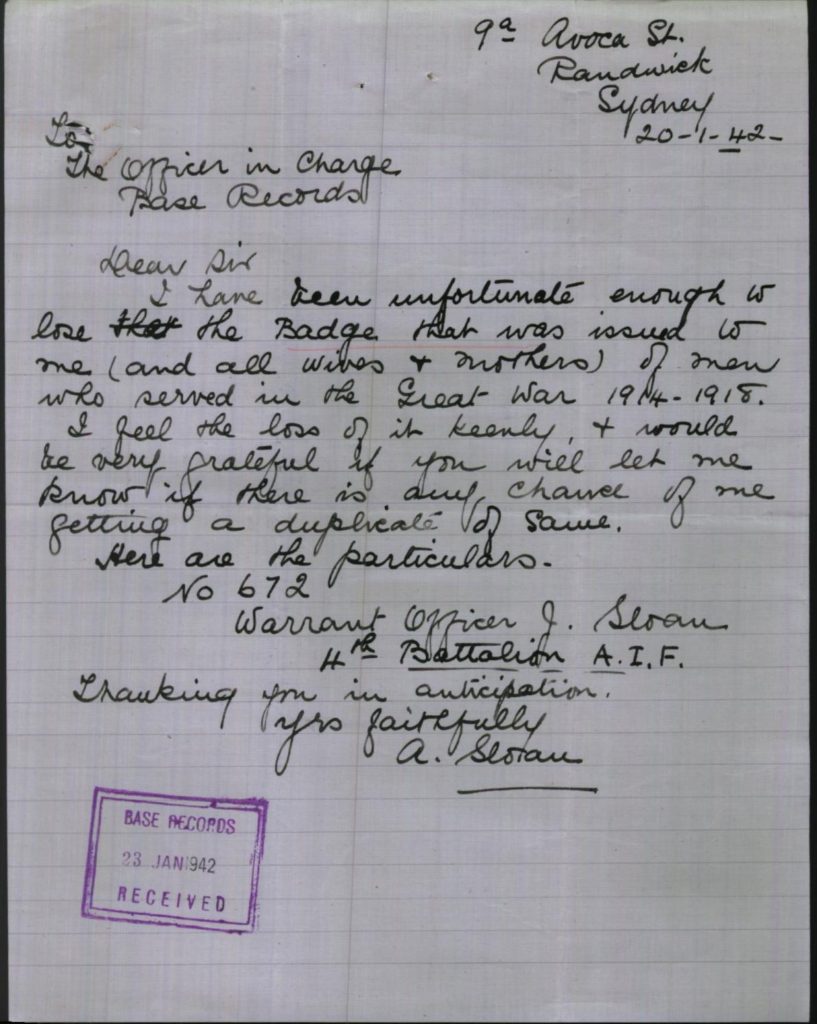
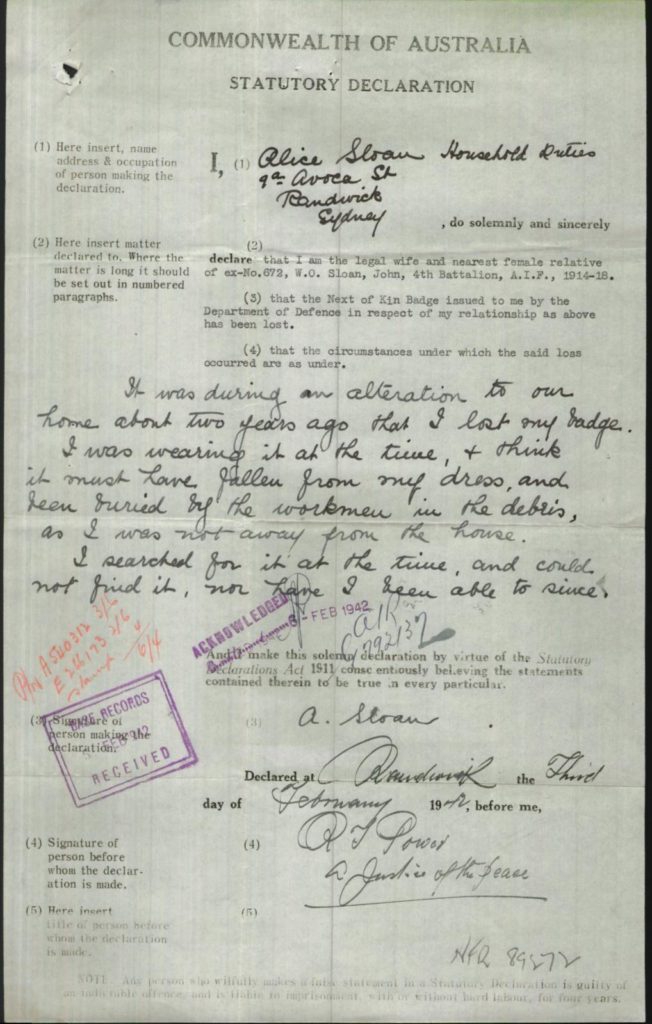
An ANZAC Poem
by a young relative of Jack Sloan
Rory Kinsella.
When Rory Kinsella, (for whom Jack was a great great-great-uncle) was a year 6 student at Arncliffe Public School she wrote a poem as part of a class project on World War 1. This was in 2017, a year before the centenary of the end of that war. In 2018 the government provided funds for recognition of that commemoration. Arncliffe School had the poem printed on a plaque and put up in the school grounds where it was unveiled at a Remembrance Day service in November 2018, together with another plaque listing past pupils who served in the war.
My Gallipoli
By Rory Kinsella (Year 6, 2017)
I am Private Frankie,
No.3456, Auckland Mounted Rifles,
I joined up with my mate Andy a few months ago.
Yesterday the Auckland Mounted Rifles were ordered to capture the Turkish position, at Chunuk Bair
Our Father who art in heaven,
Andy and I were determined to succeed and escape without injury,
Or at least fatality.
Hallowed be thy name,
We were running faster, faster, faster,
Then they were gone, and I fell.
Thy kingdom come,
I was on the ground, not asleep, not awake, but almost unconscious because of the pain,
I tried to move but the dizziness in my head was too great and I had to stop.
Thy will be done,
My uniform was wet, with water I first thought, but no, of course not.
Shot in the stomach, unable to move, sun blazing down overhead.
on Earth,
I reached into my coat pocket and pulled out a blood-stained photograph.
As it is in Heaven.
She was smiling, her eyes were shining, and ‘Come home-‘ she had said. ‘Please just come home.’
I put the photograph over my heart and closed my eyes.
This is and always will be my Gallipoli.
Some Maps of The Gallipoli Peninsula

Some Maps of The Gallipoli Peninsula

John (Jack) Sloan
(1878-1961)
The Story of an ANZAC
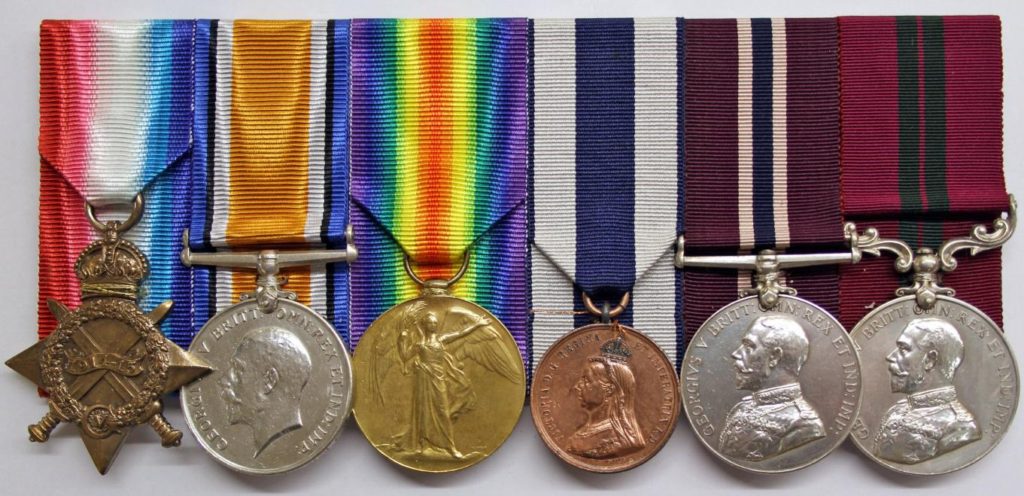
The medals awarded to Jack Sloan.